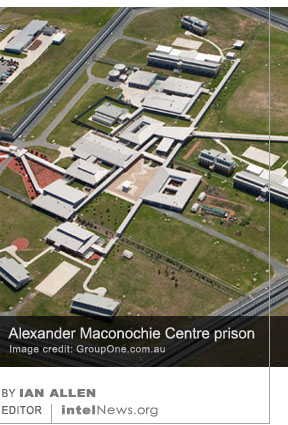Australian court releases judge’s remarks in unprecedented ‘secret prisoner’ trial
April 24, 2023 2 Comments
 AN AUSTRALIAN HIGH COURT has released the sentencing remarks in an unprecedented closed-door trial of an intelligence officer, identified only as “Witness J”, who was convicted in 2019 of a crime that cannot be revealed. The man, who is also known as “Prisoner 123458,” was given a jail sentence in November of 2019. His sentencing came following a closed-door hearing, which was described by a judge as “generally undesirable” and “unusual”. The very existence of the court case came to light only after Witness J filed a lawsuit against the jail in which he was being held, arguing that his treatment was substandard.
AN AUSTRALIAN HIGH COURT has released the sentencing remarks in an unprecedented closed-door trial of an intelligence officer, identified only as “Witness J”, who was convicted in 2019 of a crime that cannot be revealed. The man, who is also known as “Prisoner 123458,” was given a jail sentence in November of 2019. His sentencing came following a closed-door hearing, which was described by a judge as “generally undesirable” and “unusual”. The very existence of the court case came to light only after Witness J filed a lawsuit against the jail in which he was being held, arguing that his treatment was substandard.
Witness J is believed to be in his mid-30s and to have served for many years as an intelligence officer in the Australian military, with a top secret security clearance. He is also believed to have served in Iraq, Afghanistan and East Timor with a distinguished service record. But he drew the attention of counterintelligence investigators in 2018, while undergoing a routine re-evaluation of his security clearance status. During that time he was reportedly serving as a civilian in an undisclosed country in Southeast Asia. This period, according to reports, coincided with the deterioration of Witness J’s mental health.
Witness J was eventually jailed in mid-May 2018 and spent a month in solitary confinement. He was then placed in a high-security wing for serious sex offenders at the Alexander Maconochie Centre prison in Canberra. This was not because he was a sex offender, but because it was determined that he would be safer there than in the other wings of the prison. In early 2019, Witness J was sentenced in a closed-door trial, which was held under the secrecy provisions of Australia’s 2004 National Security Information Act. He was released from prison 15 months into his 24-month sentence, after agreeing to plead guilty to security breaches.
Last week, the Supreme Court of the Australian Capital Territory (ACT) released the sentencing remarks of the judge in Witness J’s case, which had remained secret since November of 2019. According to ABC News, the remarks are heavily redacted in order to comply with restrictions under the National Security Information Act. The redacted document makes clear that Witness J faced a total of five charges. However, the sentencing remarks make no mention of the nature of the charges against him.
In his remarks, the judge in the case, Justice John Burns, mentions that the court had been given a report by Witness J’s doctor, which detailed his deteriorating mental state and his depression. The judge goes on to explain that he took the doctor’s report into account in sentencing Witness J. He argues, however, that despite his illness, the accused was aware of his actions and deliberately chose to conduct himself in a “grossly reckless” manner.
► Author: Ian Allen | Research credit: P.C.| Date: 24 April 2023 | Permalink
 An unprecedented closed-door trial of a man identified only as “Witness J”, who was convicted earlier this year of a crime that cannot be revealed, has raised questions about the relationship between security and the law in Australia. The man, who is also known as “Prisoner 123458”, was sentenced to a jail sentence in February of this year. His sentencing came following a closed-door hearing, which was
An unprecedented closed-door trial of a man identified only as “Witness J”, who was convicted earlier this year of a crime that cannot be revealed, has raised questions about the relationship between security and the law in Australia. The man, who is also known as “Prisoner 123458”, was sentenced to a jail sentence in February of this year. His sentencing came following a closed-door hearing, which was 





